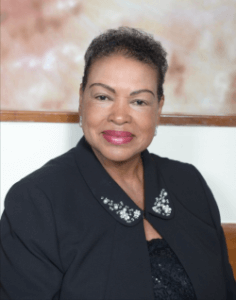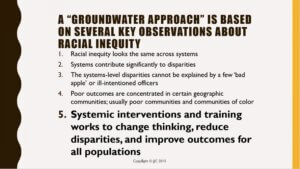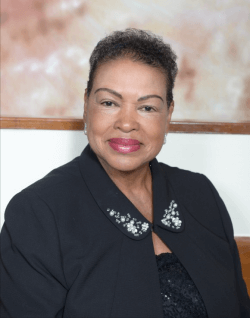
By Anne Deepak
On Thursday, December 2, 2021, Monmouth University’s School of Social Work’s Growing Together as Allies lecture series (GTAA) hosted Joyce James who delivered a presentation titled, “Supporting Systems and Communities in Achieving Racial Equity: A Groundwater Analysis.” This session was co-sponsored by the Institute for Global Understanding and was partially funded by a Diversity Innovation Grant from the Intercultural Center. GTAA is a committee of faculty, students, and alumni working to advance anti-racism within the school, university, and community. Dr. Anne Deepak, Associate Professor in the School of Social Work, and Professor Leah Lazzaro, Assistant Dean in the School of Social Work, moderated this session.
For forty years, Ms. James has worked to enhance outcomes for vulnerable children, youth, and families. Her professional social work journey from Child Protective Services (CPS) caseworker to Assistant Commissioner of Texas CPS, to a leader of the Center for Elimination of Disproportionality and Disparities (CEDD)/Texas State Office of Minority Health at the Texas Health and Human Services Commission is a powerful one. Her leadership and persistence in raising issues of institutional and structural racism in helping systems influenced Texas to pass legislation that directly addressed racial inequity in child welfare, health, mental health, education, and juvenile justice. She is currently the President and CEO of Joyce James Consulting.
Ms. James began the presentation with an explanation of the different forms of racism and stressed how crucial it is to understand how each form of racism relates to other forms of racism. Since racism is usually seen only at the individual level, it is easy to assume that racism is perpetuated by a “few bad apples” in society. However, Ms. James explained that the deeper issue is racism on a structural level because this form of racism is embedded in our society’s rules, practices, and culture. Hence, removing the bad apples from systems that produce racial inequity will not solve the problem; the focus of change must be on the system rather than on the individuals within it. Throughout the presentation, Ms. James shared the collective impact of historical and current racial inequity throughout systems.
Her core message to social workers and people working in helping systems was that, without an understanding of institutionalized racism, we do harm. She emphasized that there is a critical need for us to understand how all these systems create this harm. Once we have that analysis and understanding we must become critical lovers of our systems to make change, and we must invite in the community to inform us of how systems can better serve them.
The session concluded with thoughtful reflections and questions from audience members. This led to a discussion on audience members’ own experiences with racism and questions on how we can change the racist social systems in the United States through the organizations and institutions we participate in.
To learn more about the other sessions hosted by the School of Social Work Growing Together as Allies Fall 2021 Speaker Series, please click here.

